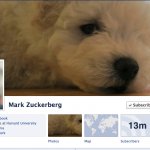
Facebook became a $104.2 billion company Friday in much the same way it became the world’s biggest social network and a cultural game-changer: by stubbornly forging ahead despite criticism and calls that it couldn’t be done.
Last week, rumors turned into full-blown financial news stories that the initial public offering was getting a lukewarm reception in road-show presentations to investors in New York City, Boston and Palo Alto, Calif. CEO Mark Zuckerberg was criticized for wearing his trademark hoodie to the event in New York and skipping the event altogether in Boston, and some analysts said Facebook could open with a value as low as $75 billion.
And yet, by this week Facebook had raised its expected share price and was making more shares available to meet demand. By the close of markets Thursday afternoon, Facebook had set its opening share price at $38 (after considering levels as high as $40). Whatever happens in trading today, Facebook will be the third-largest IPO in history and will net the company $16 billion.
“It shows tremendous confidence in the guy wearing the hoodie,” Erik Gordon, a professor at the University of Michigan’s Ross School of Business, told Bloomberg. “He hasn’t specified how he’s going to do it, but he’ll have to do it to justify this price.”
Market Cap Now More Important than Number of Registered Users
But share price doesn’t really matter. The most important number for now is that $104.2 billion. The $100 billion marker is symbolic, as is so much that surrounds Facebook’s evolution into a publicly traded company. Beyond the hoodie, Zuckerberg has been sending all sorts of signals that he’ll be a different kind of CEO, from his decision to not travel to New York to ring today’s opening Nasdaq bell, to celebrating the IPO not with champagne but with Red Bull (the company had one of its famed hackathons last night).
And while $104.2 billion can (and will) change as Facebook ebbs and flows through the ups and downs of being a publicly traded company, at least for now it makes the eight-year-old company more valuable than all but a handful of U.S. companies. Facebook is bigger than McDonald’s, bigger than Citigroup and – also symbolically – bigger than Amazon, arguably the biggest success story from the first dot-com boom.
“Facebook is here to stay,” Navin Chaddha, a managing director of the Mayfield Fund, a venture capital firm, told The New York Times. “It’s a virtual economy where people are spending more time than any other Internet property.”
Still, its stock is still highly speculative, leaving investors unsure of what to do. A steady stream of them have been interviewed on cable television and all make the same basic point: Invest in the company and you may see it wither, much as

0 Responses
Stay in touch with the conversation, subscribe to the RSS feed for comments on this post.